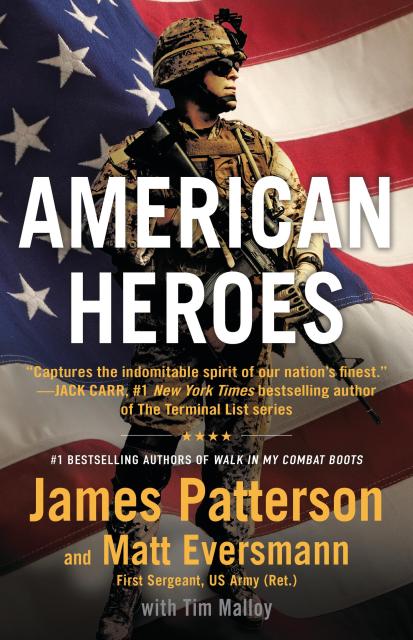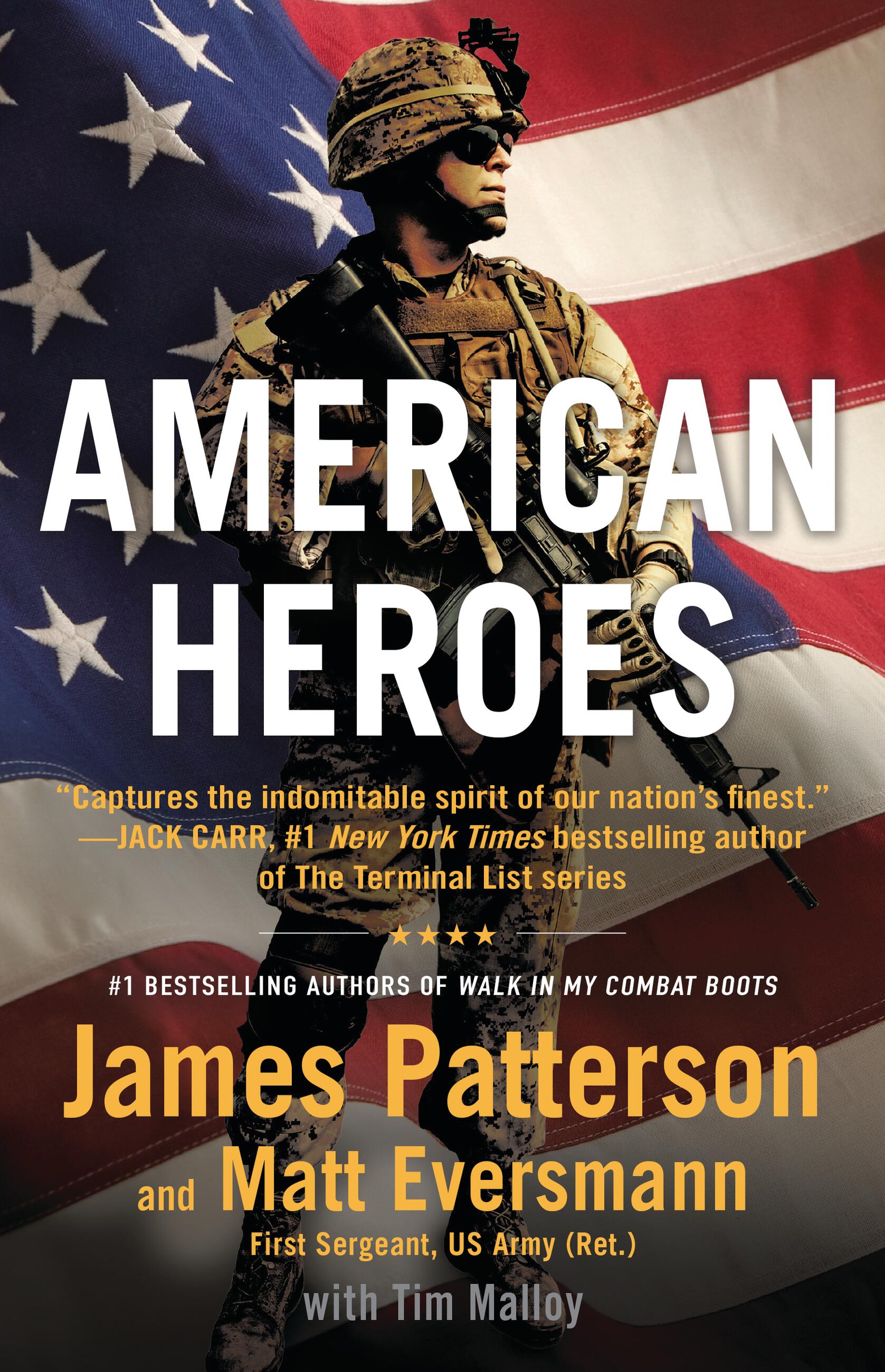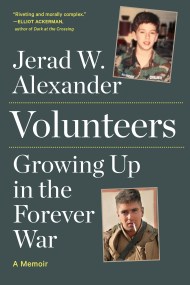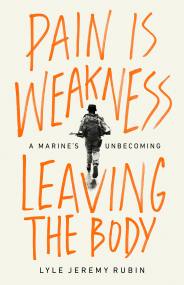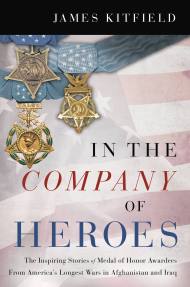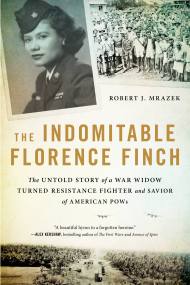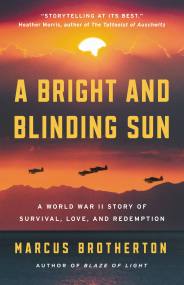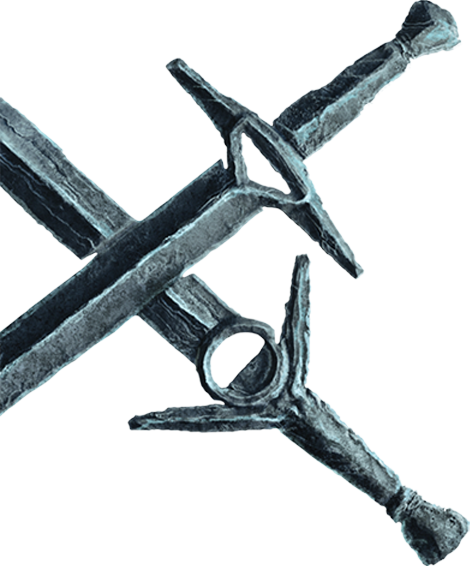
American Heroes
From the #1 bestselling authors of Walk in My Combat Boots
Contributors
By Matt Eversmann
With Tim Malloy
Formats and Prices
Price
$16.99Price
$21.99 CADFormat
Format:
Also available from:
U.S. soldiers who served in overseas conflicts—from World War II, Korea, and Vietnam to Iraq and Afghanistan—share true stories of the actions that earned them some of America’s most distinguished military medals, up to and including the Medal of Honor.
They never acted alone, but always in the spirit of camaraderie, patriotism, and for the good of our beloved country.
There has never been a better time for all of us to think about duty, sacrifice, and what it means to be an American hero.
-
“James Patterson's American Heroes is a compelling work of nonfiction that should not be missed. A riveting chronicle of valor, humanity, and sacrifice, the diverse stories within the book's pages represent the very threads that hold our flag together.”Mark Greaney, #1 New York Times bestselling author of The Chaos Agent, a Gray Man novel
-
“America at its best: ordinary Americans who found extraordinary courage and helped write our proud history in the process.”Congressman Seth Moulton, Captain, US Marine Corps (Ret.)
-
“American Heroes delivers compelling accounts of men and women at war. You can almost hear the bullets as you read these powerful stories told by and about selfless warriors. It’s a striking reminder that America’s highest awards for valor are more often earned by saving lives than by taking them.”ADM E. T. Olson, USN (Ret.), former CDR (USSOCOM)
-
“American Heroes is a gripping collection of firsthand accounts that plunges you into the heart of battle, told by those who lived it. Patterson and Eversmann deliver a raw, unflinching look at valor and sacrifice, capturing the indomitable spirit of our nation’s finest. This book is a tribute to courage that will leave you breathless and inspired."Jack Carr, #1 New York Times bestselling author of The Terminal List series
-
“Urgent and full of suspense. . . A gripping account of American military members’ experiences before, during, and after wartime.”Kirkus, starred review
-
“Extraordinarily well-written . . . Walk in My Combat Boots should be mandatory reading for every American citizen.”Army magazine
-
“A vivid and authentic portrait of life in the modern military … Powerful. This edifying collection captures the highs and lows of the military experience.”Publishers Weekly
-
“Walk in My Combat Boots will move you to tears and enlightenment . . . From despair to laugh-out-loud humor, philosophical enlightenment to cinematic action, this book has something for everyone, and means everything to someone who devoted his or her career to serving our country . . . a patriotic must-read.”Southern Living
- On Sale
- Oct 21, 2024
- Page Count
- 400 pages
- Publisher
- Little, Brown and Company
- ISBN-13
- 9780316407304
What's Inside
EXCERPT
Hershel “Woody” Williams
Corporal, US Marine Corps Reserve
Conflict/Era: World War II
Action Date: February 23, 1945
Medal of Honor
Interview with Brent Casey, grandson
My grandfather, Hershel “Woody” Williams, was a Marine who fought in World War II. A picture of Jesus hangs on the wall of his farmhouse in Ona, West Virginia. Two vials of sand from Iwo Jima sit on a kitchen shelf near a picture of him dressed in his OD‑green Marine uniform shaking the hand of President Truman as he received the Medal of Honor.
As a kid, I don’t know the details of what my grandfather did during the war or why he was awarded the Medal of Honor. I don’t know anything about the medal or its significance, only that he doesn’t wear the medal often. Maybe to a local parade or when he and my grandmother travel to some event or gala.
If my grandfather wants something done, he only asks once. He works for Veterans Affairs (VA), where he’s respected and admired enormously. He also has a horse farm, where at any given time he’s raising and training from ten to fifteen horses for other people to show.
Woody isn’t opposed to using corporal punishment to get a horse — or a kid — back in line. I’m the only grandchild who hasn’t received a horse crop to my backside, but when, at sixteen, I’m having some behavioral challenges, my mom’s solution is to send me to work on my grandfather’s farm.
“He’s going to tell you how things are supposed to be and show you how things are supposed to be,” she says.
Woody teaches me a lot about selflessness and how it relates to discipline and hard work. He inspires me to serve my country. At nineteen, I join the Army. That’s where I learn about my grandfather’s actions in Iwo Jima. Why he’s a hero who played a part in protecting this great country.
Woody is seventeen years old and lives on a dairy farm in Quiet Dell, West Virginia, with his mother and eleven siblings. War is coming — one, he is sure, that will take away America’s free‑ doms and privileges.
On October 2, 1923, Woody was born on the farm weighing three and a half pounds. Mom lost several children to the 1918– 1919 flu pandemic and was sure she was going to lose him, too. The country was in the grips of the Great Depression when Woody’s father died of a heart attack. Eleven‑year‑old Woody helped support his family, working as a taxi driver and deliver‑ ing telegrams to the families of American soldiers who were killed during the early days of World War II.
Marines wear snappy blue uniforms around town and Woody is impressed. If he’s going to war, he’s going as a Marine. At seventeen, he needs his mother’s signature to enlist.
Mom refuses to sign the papers. He turns eighteen next October. If he wants to be a Marine, he’s going to have to wait.
December 7, 1941: Japan attacks Pearl Harbor.
November 1942: Woody walks into the Marine Corps recruiting office. The recruiter doesn’t so much as glance at his papers. The man is too busy studying Woody’s stature.
“I can’t take you,” the recruiter says. “You’re too short.”
To be a Marine, Woody is told, you must be five eight or better. He’s five six.
His two brothers have been drafted by the Army. He might’ve seriously considered following in their footsteps if it weren’t for the Army’s old brown wool uniform. It’s the ugliest thing in town.
I want to be in those dress blues, he thinks.
If he can’t be a Marine, well, he’s not going. Woody returns to working on the dairy farm with Mom.
In early 1943, the recruiter shows up on his doorstep. The Marine Corps, he explains, has lowered the height requirement.
“Do you still want to go?”
“Yes,” Woody replies, and signs up.
When he thought about protecting his country, he believed it would happen here, on US soil. Instead, he’s sent eight thousand miles from home. On the boat, he looks at a map of the pork‑chop‑shaped island of Iwo Jima.
His unit is in reserve to two other Marine divisions for a campaign expected to last three to five days. There’s no intelli‑ gence, only belief in the strong chance that his unit will never leave the ship. He doesn’t know — no one does — that twenty‑two thousand Japanese have dug miles of tunnels across the island and entrenched there.
The Marines sustain catastrophic losses on the beach. Woody and his unit are parked out at sea. That night, they receive new orders to board Higgins boats to Iwo Jima.
There’s no room for them to land. All day long, they huddle down and circle, awaiting the signal. It never comes.
The next day, they head into the beach.
The ramp lowers and Woody pops his head up, catching a glimpse of chaos. The beach is strewn with bodies and limbs torn apart by bullets and explosions; blown‑up tanks and Jeeps and equipment; craters and burnt vegetation.
Exiting the ramp, Woody does a double take. Dead Marines are wrapped in rain ponchos, their bodies stacked like cord‑ wood along the black sand beach made from volcanic ash.
Woody and the six Marines with him crawl across fine sand the texture of BBs. Dig a hole and the sand refills it. Near the first airfield, sand becomes soil where they can dig foxholes.
A flag! A flag!
The Marines start yelling and shooting their rifles into the air. Then Woody sees it — an American flag mounted on Mount Suribachi, the wind unfurling its cotton fabric appliquéd with the familiar red, white, and blue stars and stripes. He joins the celebration and fires his rifle.
The airfield is protected by a cluster of bazooka‑proof concrete pillboxes reinforced with rebar and fronted with a four‑ inch‑tall aperture where the Japanese place the barrells of their Nambu machine guns and rifles to mow down US soldiers.
An all‑NCO meeting is called. Woody is a corporal, not an NCO, but Woody’s captain tells him, “I want you there.”
Sheltered inside a huge shell crater, the commanding officer explains the grim reality. The Marines are in an open area. Unless the pillboxes are taken out, there’s no way to advance against the Japanese in their protected position. They’ll have to advance on the pillboxes without any cover.
The commanding officer looks at Woody. “Do you think you can do something with the flamethrower against some of these pillboxes?”
Woody is the only flamethrower left in C Company. The other Marines who came with him, he has no idea where they are, if they’re alive or dead. He’ll never know, even decades later.
“I’ll try,” Woody says.
He trained as a demolition man stateside, knows how to use the M2 flamethrower. Its two fuel canisters filled with compressed gas and liquid diesel fuel and high‑octane gasoline are mounted on a steel rack fitted as a backpack and altogether weighing close to seventy‑five pounds. A full blast lasts about seventy‑two seconds. The weapon’s average lifespan: four minutes.
The key is to pull the trigger in bursts. Once the canisters run dry, the operator has to roll out of the backpack and put on a new one.
He’ll be moving slowly behind a bright orange flame that will draw the attention of enemy snipers.
He’s scared to death, but reminds himself, Everyone has some instinct of bravery. As long as you can control the fear, you can be brave. He thinks of Ruby, the girl waiting for him back home.
When the war is over, he’s going to marry her.
Four Marines are assigned to cover Woody. He selects another Marine to be his “pole charge man.” After Woody sprays liquid fire through the aperture, the pole charge man probes the pillbox with a long piece of wood capped with an explosive fatal to any enemy who’s survived the flamethrower attack.
It’s time to get to work.
The combat is fierce, so intense as to blur his actions over the next four hours. Some events and moments he’ll never recall. Others will live vividly within him forever.
He remembers crawling on his stomach to reach the top of one pillbox. There, he sticks the flamethrower’s nozzle down a vent pipe and squeezes the dual trigger. He remembers his pole charge man taking a round to the head. The man’s helmet saves his life, but he’s taken out of commission. Woody takes over the man’s duties preparing the explosives.
He has no idea how he repeatedly gets his hands on fresh fuel canisters — people say he ran back to the lines; others say Marines delivered canisters to him. Two of the four Marines assigned to cover him are killed. He remembers how each man died and he remembers being on his own, bullets pinging off the tanks strapped across his back and, near the end, Japanese soldiers bursting out of the pillbox with bayonets fixed to the rifles, determined to take down the small American Marine who has killed so many of their own. Woody remembers, will always remember, pulling the trigger and watching the Japanese soldiers catch on fire before falling to the ground.
He feels no remorse. The Japanese have killed many Marines — including his best friend, Vernon Waters. The battle — the war — needs to be won. He keeps fighting, a one‑man killing machine, and by the time he’s done, he has managed to wipe out seven pillboxes.
Woody doesn’t think he’s done anything special. He was just doing his job.
In the Army’s 82nd Airborne Division, I serve as a combat medic deployed to Saudi Arabia to support Operation Desert Shield/Desert Storm. Day after day, I try to do my job while another part of me is full of fear — fear of the unknown.
In 1991, I return home. That’s not true. Only my body returns. My brain . . . is still somewhere overseas.
I get divorced and hit the bottle. I self‑medicate for fifteen years. I end up homeless, jobless, and carless. I have absolutely nothing left except for addiction and alcoholism.
In 2005, my mother, brother, and Woody come collect me. I’m taken to the VA hospital in Huntington. I’ve never been to the VA. The doctor tells me that I’ve flagged 19 out of 19 on my PTSD questionnaire.
“What the hell is PTSD?” I ask.
“Don’t worry about that,” the doctor replies. “You’re in the right place. We’ve got all the tools and resources you need to get back on track.”
I get involved in the VA’s rehab and PTSD residential reha‑ bilitation program. I learn healthy coping skills. Woody helps me the entire time. He, too, was diagnosed with PTSD. He’s all too familiar with my struggles.
My grandfather shares the nightmares he had after the war — fighting fires instead of shooting fire. One time he jumped out of bed and pounded the wall because he believed it was on fire. Attending the Pea Ridge Methodist Church changed his life.
The nightmares stopped, but the regrets he had over killing people remained.
The VA completely changes my life. I go back to school, get a bachelor’s degree in business administration and management, then work full‑time on my MBA with the goal of becoming a teacher.
My grandfather retires — from the VA and from horse farm‑ ing. When Woody turns eighty, my grandmother says, “It’s time to hand up the horse reins.” He does, moving about a thousand yards down to the bottom of the hill, where he can still see the farm and, whenever he wants, walk back up and take a look at the horses.
Woody continues his speaking engagements and I often accompany him. My grandfather doesn’t need the money he earns, so I say, “Papa, why don’t we do something with the hon‑ orariums and create a nonprofit?”
Woody loves the idea.
I get together with my brother Bryan, who has a law degree. He works on the 501(c)(3) form while I go about assembling a board of directors for the foundation we create together. I’m build‑ ing out the website when I receive a call from my grandfather.
“I was at Donel C. Kinnard Memorial State Veterans Ceme‑ tery and came up with an idea,” he says. “I’ve been working with an architect. I’m going to snail mail you some copies of this monument I have in mind.”
“This monument, what is it?”
“It’s going to honor Gold Star Families.”
That’s what the military calls immediate family members of a soldier who died in the line of duty. I do a Google search for “Gold Star Families Memorial Monument.” None exists.
“You’re not going to believe this,” I tell my grandfather. “Your idea for ‘Gold Star Families Memorial Monument.’ It’s original.” Some might say — correctly — that the idea fell into our laps. But in our minds, it’s a God thing, no question. It’s the way
Woody and my parents raised us.
The first monument is unveiled at Donel C. Kinnard Memorial State Veterans Cemetery on Woody’s ninetieth birthday. The foundation starts to take off and I’m forced to make a decision. Do I want to write my PhD dissertation or run the nonprofit? I can only do one.
I decide to help my grandfather, pay him back for every‑ thing he’s done for me. He’s the reason I’m still alive.
The foundation dedicates twenty‑five Gold Star Families Memorial Monuments across the country. Then we start work‑ ing on establishing a memorial in each state. When we reach that goal, we expand into other countries.
My grandfather insists on attending each dedication. Even at age ninety‑eight and dealing with a leaky heart valve, he still moves at a hundred miles an hour. On the road together 230 days a year, we share airplane flights, hotel rooms, and meals.
One day at home, Woody makes a misstep. Instead of the bathroom, he steps into the stairwell. He tumbles down all eighteen steps and is knocked out. He breaks five ribs and his pelvis in three places.
He spends a month in the hospital, then two months inside a physical rehabilitation center. Tell my grandfather to do twenty‑five push‑ups and he does fifty. He’s released in time for Christmas. By January, he’s completely recovered.
We’re in Dallas, Texas, for the groundbreaking of the National Medal of Honor Museum when we receive a call from the World War II Museum in New Orleans, Louisiana. They want to create a 4D hologram of Woody so that museum visitors from all over the world will be able to sit down and have a simulated conversation with him.
My grandfather can’t wrap his head around the concept. And he isn’t excited about going to California where, over several days, he’ll be filmed using sophisticated technology. The week before we’re scheduled to leave, he calls me to cancel.
“Papa, you don’t understand,” I say. “The museum has already paid for our expenses, has everything in place to film.”
He doesn’t want to go.
I text the other four grandsons. We all get on the phone with him, talk him through how this is a unique opportunity.
“Papa,” I say to him, “my kids’ grandkids will be able to go to the World War II Museum forty, fifty years from now. What better way to leave your legacy and your story behind?”
It takes some effort, but we manage to convince him. A friend offers the use of his private jet and Woody flies to Holly‑ wood and films for four straight days.
The technology is incredible. Museum visitors will see a projection of Woody sitting in a chair. When they ask him questions about his life, what it was like growing up in West Virginia and serving overseas, Woody will answer right back.
Around March, he develops vertigo. He gets fluid in his legs. Woody ignores it, and the fluid builds until it gets inside his lungs. We take him to Huntington, West Virginia, and the same VA hospital where I was treated, now renamed the Hershel “Woody” Williams VA Medical Center.
The VA medical staff recommend further evaluation at the Cleveland Clinic. Doctors there believe Woody’s heart has a sec‑ ond leaky valve. They can’t push the fluid out, so they put him on Lasix, a strong diuretic used to treat excessive swelling. His kidneys can’t handle the medication.
The doctors suggest dialysis.
“Nope,” Woody says. “Nope, nope, nope. We’re not doing any of that. I want to go home.”
“What do you mean when you say home?” the doctor asks. “Do you want to go to a rehab center, or do you want to go to your house?”
“I want to go to the Woody Williams VA Medical Center.”
I need to get him home right now. It takes a lot of phone calls well into the early morning hours, but I finally arrange a StatFlight, and the company generously donates their services free of charge. I manage to get Woody on the helicopter flight home the following morning, Saturday.
By Sunday, Woody’s feeling pretty good. He wants to see my mom — it’s her birthday — and my youngest brother, who he hasn’t seen in a while. My grandfather is in good spirits, sitting up in a hospital chair, but we all know he’s sick.
Senator Joe Manchin stops by Woody’s room. Woody wants the senator’s help. For some time, it’s been on my grandfather’s mind to build a protective shelter for families at the Donel C. Kinnard Memorial State Veterans Cemetery.
“I’m going to make that happen,” the senator says.
My wife, Mary, and I are with Woody in the early morning hours of June 29, 2022. I’m playing him church hymns on my iPhone. “In the Garden,” Woody’s favorite song, comes on, and that’s when my grandfather, the last living Medal of Honor recipient who served in World War II, takes his final breath, at the VA hospital named after him.
It’s another God thing.
For two days, Woody, wearing his dress blues, lies in state in the state capitol building in Charleston, West Virginia. A Gold Star Families Memorial Monument sits on the capitol lawn. Woody’s final tour continues. His casket is loaded onto a C‑130 for transport to Washington, DC, to lie in honor at United States Capitol Building — the thirty‑eighth American to do so.
My nephew, who two years ago joined the Marine Corps because of Woody, accompanies him.
A ceremony is held in the rotunda. It’s a beautiful day. Just God‑given. And special. Later, Woody will be moved to the World War II Memorial on the National Mall.
My grandfather knew of these plans before his death, and only agreed once he was satisfied that the day would honor not only him but all World War II veterans. To his very last breath, my grandfather believed he was the caretaker of the Medal of Honor.
“I didn’t earn it,” he often said. “I wear it for those Marines who lost their lives protecting mine.”
